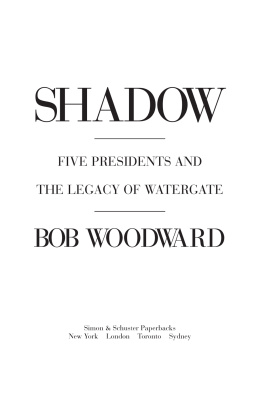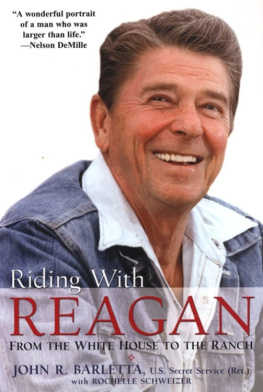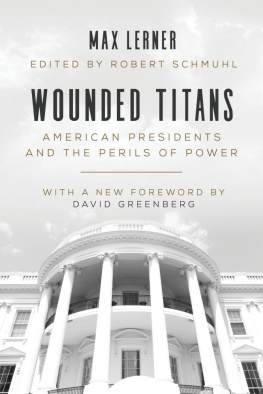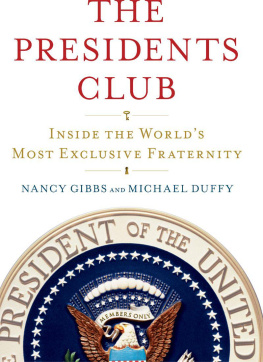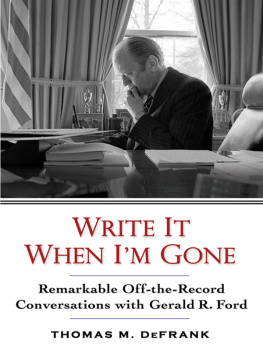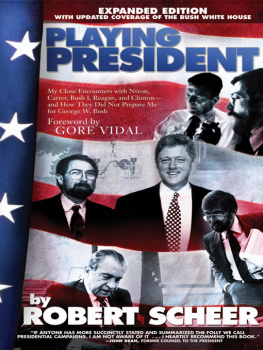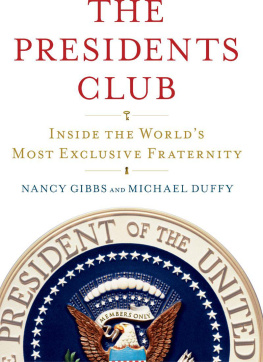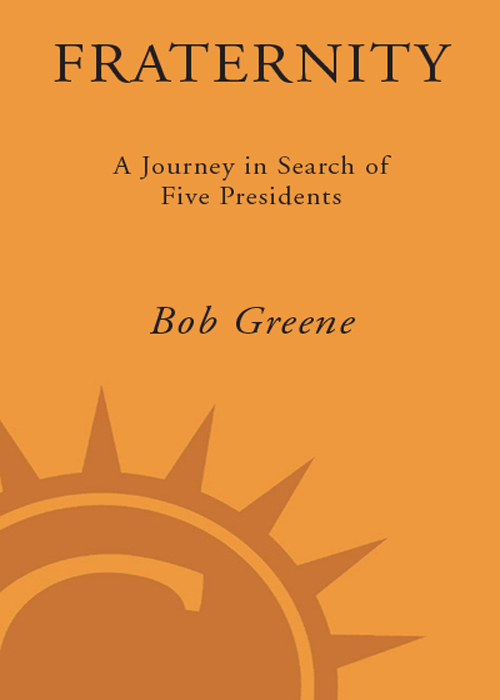
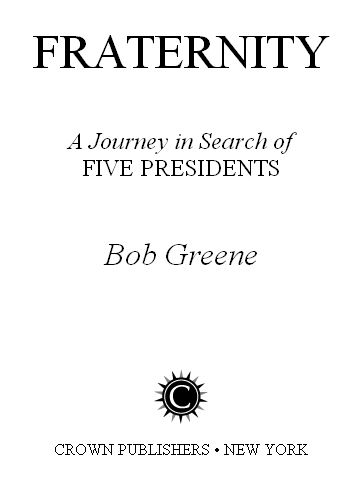
Contents
ONE
Voices
TWO
Off to see the Wizard
THREE
Do You Know How Much That Milkshake Cost?
FOUR
I Never Wanted to Be Buddy-Buddy
FIVE
You Move From One Battle to Another
SIX
I Wouldnt Want to Commit to the Rest of My Life
SEVEN
I Was a Long Distance from Home
EIGHT
You Could Hold Her In Your Hand
NINE
I Didnt See a Lobby for Four Years
TEN
A Slow-Moving Target
ELEVEN
I Hope Its History Thats Good
TWELVE
Snow This Deep on the Sidelines
THIRTEEN
Its a Fight That Doesnt End
FOURTEEN
Couldnt Bear It Without You
FIFTEEN
Duty
For Dr. Murf Klauber
and
Katherine Klauber Moulton
ONE
Voices
H ere is what they saidsome of it.
I dont allow my feelings to be hurt, Richard Nixon said. I learned very early on that you must not allow it to get to you. And as the years have gone onand this used to infuriate my critics during the White House yearsI made the decision not to respond, no matter how rough the attacks were.
I asked him about those two famous catchphrasesTricky Dick, and Would you buy a used car from this man? They had been thrown off so glibly, so routinely, for so many years by so many people who may have assumed that there was not really anyone on the receiving end, at least anyone who was listening. I wondered about the person who was, indeed, on the receiving endNixon himself. Had he ever heard the linesthe Tricky Dick and used-car lines?
Oh, my, yes, Nixon said. Yeah.
Were his feelings ever hurt?
If I had feelings, Nixon said, I probably wouldnt have even survived.
Here, along the journey, is what they saidsome of it:
I went to visit a middle school, Jimmy Carter said. One of the bright young girls asked me why theres an old person who loses Social Security payments. I told her that couldnt happenonce you start drawing Social Security you dont lose it unless your income goes up.
She said, No, my granddaddy doesnt make anything, and he lost his Social Security. And I said, Sweetheart, you must be mistaken. She said to me, Mr. Carter, you are mistaken. She said, My granddaddy lives on the bridge over by the new domed stadium, and since he doesnt have a mailing address they cut off his Social Security.
Carter was talking about the mysteries of compassionwhy the need to help others kicks in in some peoples lives, and why others are able to walk away from the troubles of people who dont have enoughor at least are able to turn their heads, in the hopes of not seeing the troubles.
He said that the question from the girl in the middle schoolthe girl whose grandfather lived on the bridgewas not a question he would have heard in the schools of his own, more affluent, grandchildren, in their own, more prosperous, communities.
I think most of us find it difficult to cross the barrier that we erect around ourselves, Carter said. We prefer naturally to be among folks just like us, so we feel at home and we talk the same language, we wear the same clothes, drive the same kind of cars, go to the same kind of schools, live in the same neighborhoods, and we feel that that circle of friends wont put a burden on us.
You know. They wont make us feel guilty. They wont make us feel obligated.
Here is some of what they said:
We were out at a hotel in Hawaii, George Bushthe first President Bush, George Herbert Walker Bushsaid. Maui.
This was after he had left the presidency, he said. He and his wife had gone for a walk on the beach early in the morning, just to get some exercise and talk to each other and look at the water before the sun was all the way up, before the sand was full of tourists and vacationers. At a time of the morning when they could still have some solitude and privacy.
So George and Barbara Bush were walking near the ocean.
And they had, on the beach, carved deep into the sand, a swastika, he said.
He said he didnt know who had done it.
And in the middle of it, the Star of David, Bush said. And next to it, another swastika.
I got so madit was six in the morning, and I was walking with these Secret Service agents, and I was almost just crying.
He said he was unable to continue with his walk. The hotel, he said, was a very rich, unbelievably secluded thing, and there was the swastika, on American soil, and the old World War II combat pilot who had become president of the United States thought of some of his comrades from the war, men who never made it home: people who gave their last breaths, he said, to defeat the Nazis.
Six oclock in the morning, Bush said. I took a rake, and I said, Lets clean this up, Barbara.
He did it himselfhe found a rake and erased the swastika in the sand?
Yeah, Bush said. Yeah.
Here is what they said, some of it:
I would be scared, Gerald Ford said.
We were talking about how Ford would feel if he had a child growing up in an American city today.
Ford had always seemed so optimistic about the countryhe had always seemed to be skittish about nothing, nervous about no one. But he would be frightened for his sons and his daughter if they were children today?
I would, he said.
And not just for his children. For himself, too.
If he didnt have Secret Service protection, he said, he would not want to take a walk through downtown New York or Los Angeles or Chicago all by himself late at night.
Id be apprehensive, alone, Ford said.
But he was always known as a big, strong guy, a former athlete who kept himself in shape.
That doesnt do you much good when somebody comes up with a knife or a gun, he said.
In fact, such people had come up to Ford twice when he was president. Two women, on two separate occasions, had tried to assassinate him. Because the women failed, many people before long forgot about the incidents, at least about the specifics.
I asked Ford if he remembered the women.
Yeah, the two of them, he said. Sara Jane Moore, and...
He tried to come up with the other womans name.
One of them wrote me, Ford said.
She had? From prison? I asked him which woman it had been. Squeaky Fromme?
Squeaky, I think, Ford said.
So the woman who tried to kill him actually dropped him a note?
There was a strange letter, he said. Of course, she tried to and did escape. They caught her two or three days later.
Did the Secret Service show him the letter she had written to him?
Well, thats interesting, Ford said. The letter came to me, and Ive saved letters from all kinds of people. Before I became president and after. And I had these evaluated forI just wanted to know their worth. That was one of the most valuable.
He had shown the letter to an autograph dealer?
He started to laugh. Its amazing, he said.
You didnt sell it, did you? I asked.
Oh, no, Ford said.
So of all the presidential papers he had saved, all the documents that played a part in affecting the course of nations and of world politics, the one that would bring the most on the open market was a letter from a woman who had wanted to shoot him?
Yeah, Ford said, laughing anew.
Here is what they said:
Come on out, Ronald Reagan said. Come have a visit.
He said it in a letter from the house where he lived in retirement in California.
Next page

